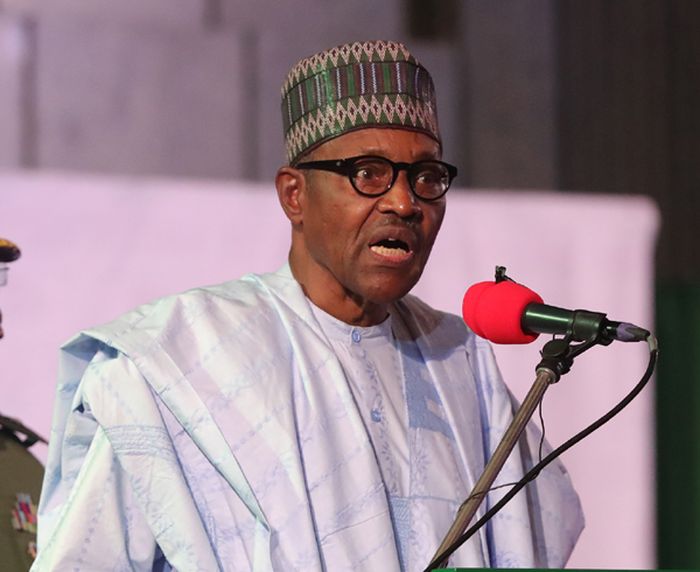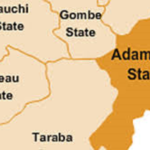By Stephen Ekedum
CLAIM: In one of the national dailies, Vanguardngr.com, President Muhammadu Buhari, on the side-lines of the Nigeria International Partnership Forum (NIPF) in Paris, France, on Wednesday, November 10, 2021, said investors can come and invest in Nigeria because his government has rightly put its economy on the path of growth and development.
- Christmas: Udom urges citizens to reject politicians inciting violence
- FCT imposes restriction on worship places, bans parties, night club
According to Vanguardngr.com, Buhari said, “Recognising the importance of security to a nation’s risk profile, we re-assessed and updated our National Security Strategy in 2019.
“The implementation of this multi-sectoral strategy has contributed to the progress we have made in fighting insurgents and terrorists in the North East of the country.
“Working closely with international partners, we are firmly addressing the root causes of crimes and taking measures to prevent and counter-violent extremism.”
FACT CHECK PROCESS: In an attempt to verify Mr President’s claim, fact-checkers at the Centre for Democracy and Development (CDD interrogated the available data.
ASSUMPTION OF OFFICE: President Muhammadu Buhari’s struggle to return to power over 30 years after his 25-month reign as a military head of state crystalised on May 29, 2015, when he was sworn in as the nation’s fourth democratically elected president. This occasion preceded his electoral triumph against the incumbent President Goodluck Jonathan in a keenly contested poll.
Records show that Buhari met a nosediving economy – import dependent, depleted foreign reserve, freefalling naira against forex and increasing bombing and kidnapping by Boko Haram insurgents, among others. However, he did not do well enough to address the emergencies on time.
According to the reports, “when President Muhammadu Buhari took over in 2015, the economy was already in decline; a decline that can be attributed to the neglect of the economy during the campaign period and the resurgence of hostilities by the Niger Delta militants. The simultaneous decline in the production and price of crude oils combined to create fiscal fragility at the early stage of President Buhari’s administration. The impact of the fiscal crisis on GDP growth, many believed, would have been ameliorated had the Buhari administration hit the ground running (Allison, 2015).
“However, the six months delay in forming the executive, during which time oil production declined to 1.6 mbpd and the price dropped to US$44 a barrel, contributed significantly to Nigeria’s economic contraction in 2016. In response to this contraction, the government introduced the Economic Recovery and Growth Plan (ERGP) 2017-2020. Although the economy crawled out of recession in 2017; real GDP grew by just 0.8%, less than the population growth rate.”
TRANSPORTATION: Under the administration of President Muhammadu Buhari, records have shown that significant investments have been made in the nation’s Transport infrastructures, with building and maintenance of Roads, Bridges, Rails, and Airports, gulping the bulk of the money.
For instance, out of Nigeria’s total 200,000 kilometres of surface roads, the Federal Government accounts for 32,000 kms, a figure that represents 18% of the total, 70 per cent of the national vehicular and freight traffic. The Local Government roads make up about 150,000 km, the 67 per cent total of which are mostly untarred. The State roads constitute 15 per cent (about 17,000km), and 78 per cent of the roads are noted to be in poor condition.
In 2020, Buhari’s government established a company called InfraCo Plc, an infrastructure development entity, with a take-off capital of N15 trillion, to manage and facelift the Federal portion of the Roads. This leap was consequent upon the inauguration of the Presidential Infrastructure Development Fund (PIDF) in the same period under review, with more than $1 billion capital funding for the initiative.
TRAIN: In June, earlier in the year, the President launched the 157km Lagos-Ibadan Standard Gauge Rail (SGR), a 150km/h line, with a seven-kilometre branch, constructed by the China Civil Engineering Construction Corporation (CCECC). This was said to be a complementary arrangement for the newly refurbished Lagos-Ibadan Expressway that has been left unattended for years and transformed into a death trap that consume lives of road travellers every day.
AIRPORTS: The president also approved four international airports as special economic zones: Lagos, Kano, Abuja and Port Harcourt, in addition to the construction of new runways for Abuja and Enugu international airports to be funded by Sukuk Bond and a Chinese loan.
SEA PORTS: He gave approval for new private-sector funded deep sea ports: Lekki Deep Sea Port (construction already well underway, for completion in 2022); Bonny Deep Sea Port (ground-breaking done in March 2021); Ibom Deep Sea Port; and Warri Deep Sea Port.
Report had it that with development of capacity at the Eastern Ports, in December 2017, Calabar Port commenced export of bulk cement to Tema Port in Ghana. In 2019, three container ships berthed at Calabar Port, for the first time in eleven years; dredging of Warri Port (Escravos Bar-Warri Port channel) was completed in 2018. On October 30, 2019, an LPG tanker operated by NLNG, berthed in Port Harcourt – the first time ever an LPG ship would berth in any of the Eastern Ports.
INSECURITY: Under President Buhari the country has substantially been bedevilled with insecurity and threats of disintegration.
Prior to his assumption of power, Boko Haram insurgents had largely held the country hostage, bombing and killing indiscriminately. Buhari’s government has, however, helped address this monumental threat momentarily.
However, the marginal gain recorded in this fight seems to have been eroded by the regrouping and transformation of the insurgent groups into more vicious, heartless and killing machines killing, maiming, kidnapping and torturing Nigerians, mostly women and children.
For instance, the United Nations Development Programme (UNDP) 2020 Report revealed that over 350,000 people have been killed by insurgents in the North East alone. This is beside the over two million displaced.
Punch Newspaper, on Saturday, December 8, 2021, reported on its front page that in recent months over 800 people had been killed by bandits in Kaduna, Sokoto, Zamfara and Borno states and that the onslaught did not appear to be slowing down.
Wall Street Journey, one of the leading and most reputable international media organisations, recently reported how the Buhari-led government had to pay huge sums of money to insurgents in order to excuse his presidential plane from being blown up with their rocket launchers.
POVERTY: According to World Poverty Clock, 41 per cent (86,674,882) of Nigeria’s total population (209,661,008) live in extreme poverty and on less than $1.90 per day. In 2018, under the same President Buhari, the World Bank designated Nigeria as the country with the largest concentration of poor people in the world. Nigeria became the world’s capital of poverty after wresting power from India, a country of over 1.2bn population that has continued to lift its people out of poverty through unrelenting investments in education, craft, science, technology, and other economic empowerment initiatives.
EXCHANGE RATE: As of Friday, December 17, 2021, $1 was changed for N410.16, according to the Central Bank of Nigeria (CBN). In 2015, Buhari’s government met the same exchange rate at between N178 -N197. Whatever his government might have been doing appears inconsequential, compared to the real outlook, and its effects on the daily lives and businesses of Nigerians and investors.
DEBT PROFILE: Nigeria’s National Debt Profile as at September 30, 2021, stood at 37,955.090.000, according to the Debt Management Office (DMO).
Loans obtained from China’s EXIM Bank between April 26, 2016, and December 27, 2019, was at a total of $16,323,397.32. The irony is that some of the loans have expansive repayment plans of up to 20 years, over 14 years after he would have left office.
One of such loans was the $208.90m he collected for the four Nigerian airports’ terminal expansion on December 27, 2019. Though at 2.75 per cent, the repayment will lapse in 2039, 20 years after Buhari would have left office, another source of worry for future governments.
UNEMPLOYMENT: According to the National Bureau of Statistics (NBS), Nigeria’s unemployment rate increased to 33.30 per cent in the fourth quarter of 2020 from 27.10 per cent, over 60m of the total population. Youth unemployment was pegged at 53.40 per cent by NBS. Meanwhile, Buhari has promised series of economic interventions that would ultimately lead to gainful employment for 100 million of Nigerians. As at this time, the promise is still being awaited.
HEALTH SECTOR: Other than the coordinated efforts against the COVID-19 pandemic, nothing much has happened to the Nigerian health sector. In fact, the president himself and his political chieftains like Senator Bola Ahmed Tinubu who many believe is planning to succeed him have continued to treat themselves in foreign hospitals at the slightest headaches.
Conclusion: According to CDD Fact-checkers, record shows that Buhari’s government has substantially invested in long-term infrastructure, ostensibly to aid the economy, but this supposed gains have been taken away by insecurity, unemployment, growing poverty and looming famine in the land.
VERDICT: True; but misleading.




